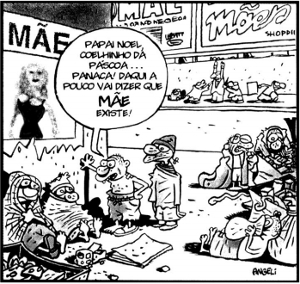Do you know what a charge is?
A cartoon is a type of illustration that usually presents a humorous speech and is present in magazines and mainly newspapers. These are drawings created by cartoonists who shrewdly capture the various everyday situations, transposing some type of criticism to the drawing, usually permeated by fine irony.
But what does cartoon have to do with language? The answer to that question is: Everything! The cartoon is not just an image, anyone who thinks it is nothing more than a graphic joke is mistaken. It is no coincidence that they are usually published in the middle of opinion articles and letters from readers. The cartoon constitutes an interesting textual genre, which combines the verbal and non-verbal language, and can indicate opinions and value judgments on the part of the speaker (the cartoonist). It is also not by chance that cartoons are increasingly present in the various entrance exams as an object of analysis.
When analyzing a cartoon, we can see that various information built from an interesting
intertextual process which forces the interlocutor to make inferences and build analogies, elements without which textual comprehension would be compromised. Note some examples of cartoons that were used as source text for Enem and Fuvest:
Charge by cartoonist Angeli, published in Folha de São Paulo on May 14, 2000 and base text for the Enem issue of the same year
Do not stop now... There's more after the advertising ;)

Charge by cartoonist Angeli, published in Folha de São Paulo on March 23, 2007 and base text for the Enem issue of the same year

Charge by cartoonist Henfil, basic text for Fuvest's Geography exam question in 2012
In a first contact, the reader may even think that the cartoon is just a funny and innocent text, but a more careful reading is enough to realize that we are facing a very rich textual genre, which criticizes personalities, politics, society, among other themes relevant. Its main objective is to establish a critical opinion and, through visual and verbal elements, persuade the reader, influencing him ideologically.
By Luana Castro
Graduated in Letters
Would you like to reference this text in a school or academic work? Look:
PEREZ, Luana Castro Alves. "Charges"; Brazil School. Available in: https://brasilescola.uol.com.br/redacao/charges.htm. Accessed on July 27, 2021.

